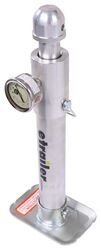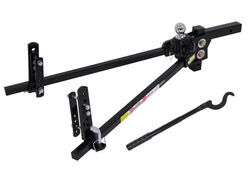
Checking Installed WD System for Proper Weight Rating to Ensure Good Ride Quality
Question:
I have a 2014 Silverado four door crew cab 4x4 standard bed bought a new camper with. a Tongue weight of 832 lbs camper is 31 foot long 6323 lbs put a equalizer tow hitch on it camper place installed it set it up truck sits level as does the camper not a lot of bounce pulls good roads are so rough I feel it could use a little help on the tongue weight end what do you recommend? By the way the tow mirrors I received from you went on easy and do a great job. Thanks
asked by: John S
Expert Reply:
If your installed Equal-I-zer weight distribution hitch setup is rated appropriately for your trailer's actual loaded tongue weight, is installed correctly and is providing the desired leveling of the tow vehicle and trailer, and your remaining concern is a rough ride on bad roads then before you consider going with rear suspension enhancement I suggest first checking a few other things.
First, check to make sure that the particular WD system you have is rated for the actual measured tongue weight of the fully-loaded trailer, with all supplies and gear in place. We offer a handy scale, # e99044. You also need to account for the weight of any cargo in the truck bed that sits behind the rear axle, such as a cooler or generator. The total TW of the loaded trailer plus that truck bed cargo should fall in the middle of the system's operating range. For example, if your Equal-I-zer system is rated for 600- to 1000-lbs, such as # EQ37100ET, the your total TW should be right around 800-lbs.
If your WD system is rated for too much weight, much more than your actual towing setup, this can result in a bumpier/jumpier ride, especially on rough roads. The extra stiffness of the over-rated bars will transmit more road bumps to the tow vehicle. If your trailer and WD system do not match up in terms of weight capacity then you can swap out just the spring bars to new ones that are appropriately rated.
Second, you can have a local mechanic check that the truck's rear suspension itself is in good order. Although only 4 years old, if the truck was/is used for heavy cargo hauling on a regular basis then the rear suspension may be fatigued. If this is the case then rear axle air bags, for instance, won't give you the results you want since they cannot overcome a worn suspension; they can only help suspensions that are in good shape.
Third, check that your trailer tires, wheels and suspension are in good order. Tires should always be inflated to their maximum psi as noted on the tire outer sidewall; also make sure the tires are rated for the actual weight load on them. If your trailer leaf springs are rusted/worn you might try correcting that before you install a suspension kit on the truck.

Products Referenced in This Question
etrailer Tongue Weight Scale for Campers and Utility Trailers - 2,000-lb Capacity
- Tongue Weight Scale
- Analog Scale
- 2000 lbs
- etrailer
more information >
Product Page this Question was Asked From
Equal-i-zer Weight Distribution System w/ 4-Point Sway Control - 10,000 lbs GTW, 1,000 lbs TW
- Weight Distribution Hitch
- WD With Sway Control
- Some Sway
- Includes Shank
- Electric Brake Compatible
- Surge Brake Compatible
- Fits 2 Inch Hitch
- Allows Backing Up
- 800 lbs
- 900 lbs
- Equal-i-zer
more information >
Featured Help Information
Instructions

Continue Researching
- Article: 5 Things to Know About Weight Distribution Hitches
- Article: 2 Steps for Finding the Right Weight Distribution Hitch Size
- Article: Determining Trailer Tongue Weight
- Q&A: Is There an Axle Flip Kit For The 2023 Northern Spirit 2145RBX Travel Trailer?
- Article: Which Sway Control Hitch is Right For Your Trailer?
- Article: How to Measure for Trailer Hitch Drop
- Q&A: Does the B&W Continuum Work w/ Trailers that Have 4 Inch Tall Frames?
- Article: 5 Tips to Confidently Choose Your Weight Distribution Hitch
- Q&A: Best Way to Prevent Sagging Suspension When Towing a Trailer
- Q&A: Difference Between 2-Point and 4-Point Sway Control on Weight Distribution Systems
- Article: Wiring Trailer Lights with a 7-Way Plug (It's Easier Than You Think)
- Q&A: Recommended Equal-i-zer Hitch For A 2024 Jayco Flight 225MLS And Instruction Manual
- Q&A: Will B&W Continuum Weight Distribution System Work with Center Frame Piece on Trailer Tongue
- Q&A: B&W Continuum Weight Distribution System Installation - Do Truck And Trailer Need To Be Level?






